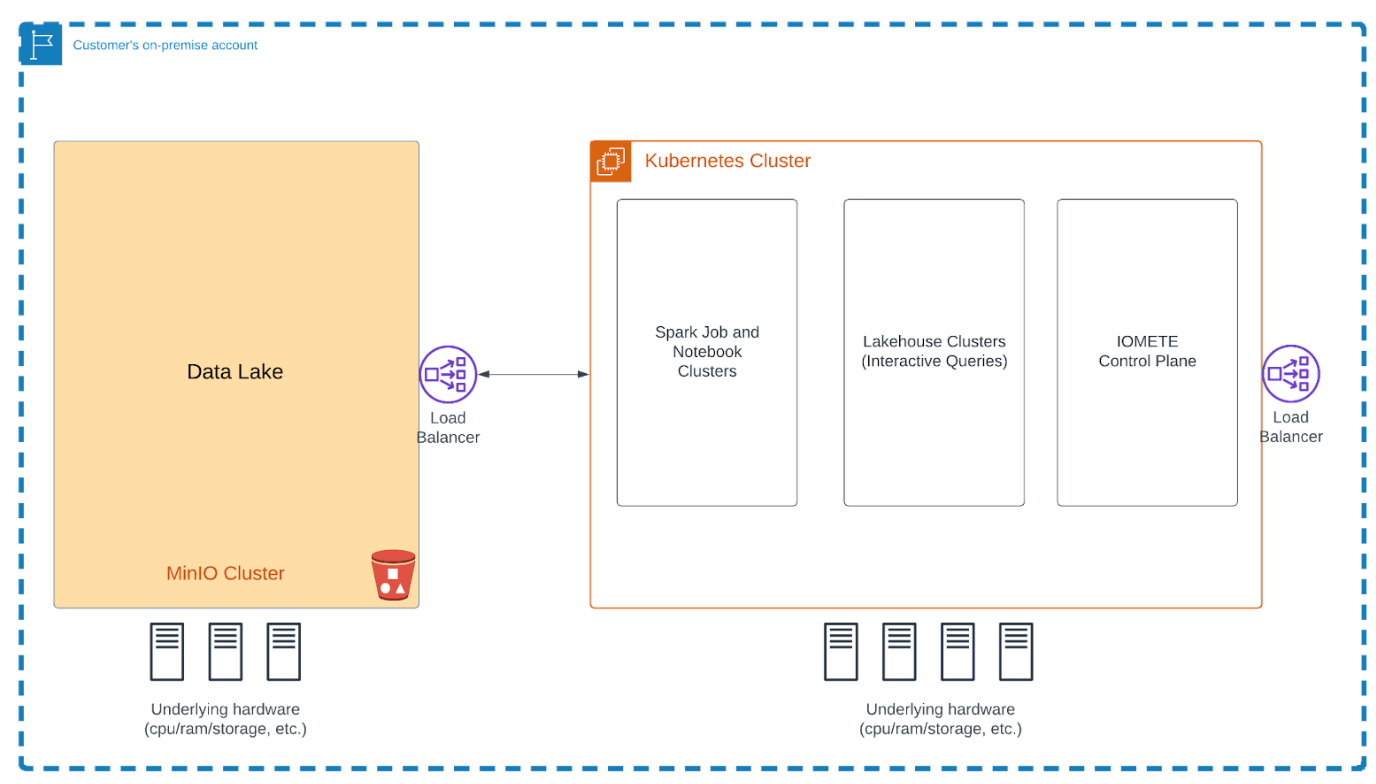Cloud-prem data lakehouse platform
IDC predicts that by 2025, the global data sphere will grow from 32 zettabytes to 175 zettabytes, which highlights the rapid growth of data in our digital economy. According to IDC, this data will be stored in three different ways: in traditional and/or cloud data centers, in endpoint locations (such as personal computers and smartphones), and in small to medium-sized enterprise data centers.
This massive amount of data must be collected, stored, and processed using a data-first strategy. We have already discuseed what a data lake is and cloud data lakes vs. cloud data warehouses. As a next step, we discuss the differences between on-premise and cloud-based data lakes. In the final section, we will discuss the type of big data platform required to process such a large volume of data.
IDC predicts that nearly 50% of the data will be stored in public cloud environments, and the reason for this is that cloud data platforms offer scalability, security, and - in certain cases - cost-effectiveness, which are critical factors for companies that need to process and store vast amounts of data.
Before we compare public and private clouds, let's define what a cloud is. The National Institute of Standards and Technology defines cloud computing as a system that meets five criteria, such as resource pooling, on-demand resource availability, broad network access, dynamic scaling, and metered services. Public clouds are one of the most popular and well-known deployment models for cloud computing. Amazon Web Services, Google Cloud Platform, and Microsoft Azure are all third-party providers of public clouds. Unlike public clouds, private clouds are implemented in-house, so organizations take full control of the cloud technology.
On premise vs Cloud computing
On-Premise and Cloud Computing both have their own advantages and disadvantages, and choosing the right option is crucial for the success of any business. In this technical guide, we will compare the Pros and Cons of On-Premise and Cloud Computing.
Pros and Cons of On-Premise Computing:
Pros:
- Full control of the hardware and software environment
- Customizable according to business needs
- No recurring monthly costs
- Greater security and compliance control
- No dependency on internet connectivity
Cons:
- High initial investment costs
- Limited scalability
- High maintenance costs
- Prone to downtime due to hardware failure or software updates
- Lack of flexibility in terms of remote access
Pros and Cons of Cloud Computing:
Pros:
- Low initial investment costs
- Flexible scalability
- Easy access from anywhere with internet connectivity
- Automatic software updates
- No maintenance costs
Cons:
- Recurring monthly costs
- Limited control over hardware and software environment
- Dependency on internet connectivity
- Security and compliance risks
Which one to choose? On premise or Cloud computing?
Choosing between On-Premise and Cloud Computing depends on the specific needs of a business. On-Premise provides greater control and security, but comes with high initial investment and maintenance costs. Cloud Computing provides flexibility and cost savings, but may come with security and compliance risks. Ultimately, the decision should be based on factors such as the size of the business, the type of application, and the level of control and security required.
It is impossible to choose the right deployment model. Each model has its own advantages and disadvantages, and the choice will depend on the specific needs and requirements of the organization. Most enterprises use a hybrid deployment model, which combines public and private clouds. Depending on the organization, certain services may be provided through the public cloud, while others may be carried out in-house using a private cloud. By combining public and private clouds, companies can benefit from both.
There are several open-source engines that can be used for cloud data processing. However, the challenge with cloud data warehouses is the required expertise. Companies that have previously used on-premise data warehouses may find it easier to transition to cloud data warehouses.
What is the cloud-prem data analytics platform
Before IOMETE on-premise data lakes were created using older technologies like Hadoop, which meant that storage and computing were tightly integrated. In contrast, cloud data lakes offer a clear separation between storage and computing. Additionally, cloud data lakes are considered to be more reliable, durable, and cheaper than on-premise data lakes. But we are the first data platform that makes it possible to analyze data available on-premise just like it's in the cloud.
Data analysis with cloud-prem lakehouse
Cloud/Prem Data Lakehouse Platform IOMETE provides cloud-like data analytics in on-premise environments. In addition to installing and configuring IOMETE on-premise environments, the IOMETE team provides full support for IOMETE on-premise environments, allowing customers to have a fully managed data lakehouse.
IOMETE platform for on-premises comes with the following main system components

Additionally, IOMETE offers secure processing of both on-premises and cloud data by creating and scaling up the compute cluster, allowing your data to be accessible only by clusters within your own account. As new data sets and workloads are introduced, the data teams face increasing pressure. However, with cloud services, they can effectively collect, organize, and make the data available for processing. Various personas like data engineers, data analysts, and data scientists can use our platform, each with its own specific needs and roles. A variety of methods are available to secure stored data with the IOMETE data platform, along with the ability to create and scale compute clusters within the user's account (on-demand capacity). It supports APIs, JDBC, ORC, CSV, Parquet, JSON, and Apache Spark optimized for on-premises and cloud deployments, as well as JDBC, ORC, CSV, Parquet, and JSON formats. We simplify your big data platform by offering open-source engines and a single-user interface. No matter which size your organization is you can setup IOMETE. We offer Free forever Plan that offers one lakehouse with seperate storage and compute. If you are not sure which plan is better fit for you book a free demo call so our team will help you to get started.